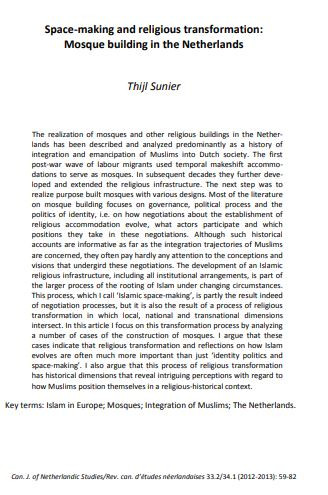
The realization of mosques and other religious buildings in the Netherlands has been described and analyzed predominantly as a history of
integration and emancipation of Muslims into Dutch society. The first
post-war wave of labour migrants used temporal makeshift accommodations to serve as mosques. In subsequent decades they further developed and extended the religious infrastructure. The next step was to
realize purpose built mosques with various designs. Most of the literature
on mosque building focuses on governance, political process and the
politics of identity, i.e. on how negotiations about the establishment of
religious accommodation evolve, what actors participate and which
positions they take in these negotiations. Although such historical
accounts are informative as far as the integration trajectories of Muslims
are concerned, they often pay hardly any attention to the conceptions and
visions that undergird these negotiations. The development of an Islamic
religious infrastructure, including all institutional arrangements, is part of
the larger process of the rooting of Islam under changing circumstances.
This process, which I call ‘Islamic space-making’, is partly the result indeed
of negotiation processes, but it is also the result of a process of religious
transformation in which local, national and transnational dimensions
intersect. In this article I focus on this transformation process by analyzing
a number of cases of the construction of mosques. I argue that these
cases indicate that religious transformation and reflections on how Islam
evolves are often much more important than just ‘identity politics and
space-making’. I also argue that this process of religious transformation
has historical dimensions that reveal intriguing perceptions with regard to
how Muslims position themselves in a religious-historical context.
I agree to the terms outlined below:
You agree to upload and assign Mosqpedia Database the rights to use the content worldwide and in perpetuity across all current and future media platforms. Mosqpedia Database may edit, copy, adapt and translate your contribution.
The content will be distributed under the Creative Commons Attribution-Deed – Attribution-NonCommercial-NoDerivatives 4.0 International – Creative Commons
All data will be stored in line with data protection regulations.